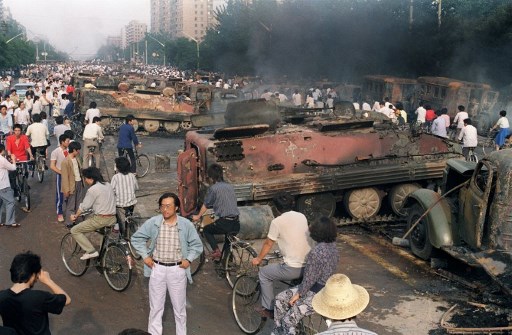
At least 10,000 people were killed in the Chinese army’s crackdown on pro-democracy protesters in Tiananmen Square in June 1989, according to a newly released British secret diplomatic cable which gives gruesome details of the bloodshed in Beijing. The document, made public more than 28 years after the event, was seen by AFP on December 22, 2017 at Britain’s National Archives. / AFP PHOTO / Manny CENETA
BEIJING, China (AFP) – At least 10,000 people were killed in the Chinese army’s crackdown on pro-democracy protesters in Tiananmen Square in June 1989, according to a newly released British secret diplomatic cable that gives gruesome details of the bloodshed in Beijing.
“Minimum estimate of civilian dead 10,000,” the then British ambassador Alan Donald said in a telegram to London.
The document, made public more than 28 years after the event, was seen by AFP at Britain’s National Archives.
The estimate, given on June 5, 1989, the day after the crackdown, is almost 10 times higher than estimates commonly accepted at the time, which generally reported a toll ranging from several hundred to more than a thousand dead.
But French sinologist Jean-Pierre Cabestan said the British figure was credible, pointing out that recently declassified US documents gave a similar assessment.
“That’s two pretty independent sources which say the same thing,” said Cabestan, a professor at Hong Kong Baptist University.
The British ambassador’s report was “not particularly astonishing considering how crowded it was in Beijing, the number of people mobilised” against the Chinese government, said Cabestan, who was in the Chinese capital in the days leading up to the crackdown.
Donald’s account gave horrific details of the violence unleashed on the night of June 3-4 when the army entered Beijing to end seven weeks of protests on Tiananmen Square, the symbolic heart of Communist power.
During their advance, armoured personnel carriers “opened fire on the crowd (both civilians and soldiers) before running over them in their APCs,” wrote the ambassador, who said his source was a person who “was passing on information given him by a close friend who is currently a member of the State Council”, the Chinese cabinet.
Once the soldiers arrived in Tiananmen Square, “students understood they were given one hour to leave square but after five minutes APCs attacked,” Donald wrote.
“Students linked arms but were mown down including soldiers. APCs then ran over bodies time and time again to make ‘pie’ and remains collected by bulldozer. Remains incinerated and then hosed down drains.”
At the end of June 1989, the Chinese government had said suppression of the “counterrevolutionary riots” had killed 200 civilians and several dozen police and military.
Nearly three decades after the crackdown, the communist regime continues to forbid any debate on the subject, mention of which is banned from textbooks and the media, and censored on the Internet. (Agence France-Presse)







